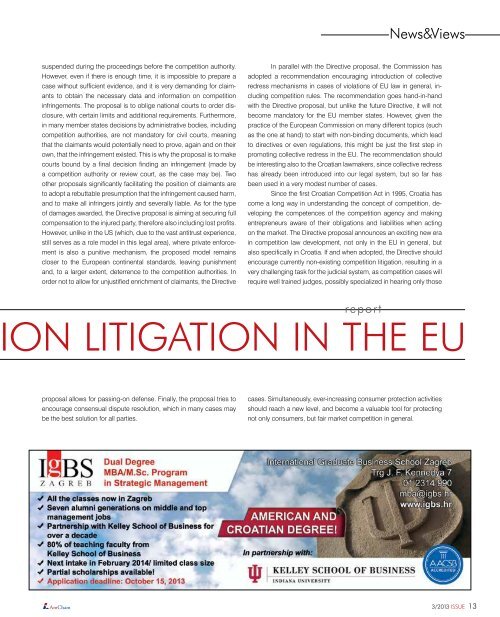News&Views››› Mario Krkaharm to individual businesses throughout the supply chain and alsoto the consumers.The European Court of Justice has held, in more than onejudgment (and not even that recently – the Courage case in 2001, theManfredi case in 2006), that any citizen or business suffering harmas a result of such infringements is entitled to compensation from theinfringer(s). However, over the past seven years, in only approximately25% of all antitrust infringement decisions that the European Commissionrendered did the injured parties turn to their national courtsto seek compensation. Moreover, it was mostly large companies whowere involved in such proceedings (and all of those in just seven EUmember states, primarily in the UK, Germany and the Netherlands),whereas small and medium enterprises and consumers rarely tookpart in the usually costly and demanding proceedings. The consequenceof such a lack of competition litigation is that individuals areleft without any form of compensation for the harm suffered, since thefines set by the competition authorities simply make an item on theincome side of the state budget.For all the above reasons, the European Commission hasbeen consulting on these issues for almost a decade, starting withthe Green Paper (2005), followed by the White Paper (2008) and theDraft Guidance Paper on Quantifying Harm (2011). The Commissionhas now decided to take the discussion to the next level and on 11Encouraging CompetitiBy Mario Krka, Senior Associate - Divjak, Topić & Bahtijarević Law firmEU competition law, as a vital tool for protecting and ensuringthe proper functioning of one of the greatest achievements of the EU– its single market, is one of the legal areas in which the community’sdimensions and harmonization play a significant role, and thereforeit is important for the Croatian lawyers and Croatian business in general.The evolution of EU competition law is still ongoing, and afterits quite successful harmonization from the public law perspective, itseems that the time has come to take steps to bring certain privatelaw institutes closer, in order to ensure that the level of protection ofthe rights of EU citizens is equal or at least comparable across theunion.Infringements of competition rules (cartels, abuses of a dominantposition etc.) in the vast majority of EU member states (Croatianot being an exception to the rule) are still regarded as the primarilyconcern of the state. Individuals usually show interest only if they arecompetitors of the infringer, since they have a strong incentive to fightagainst the forbidden practices the infringer is using to gain (unfair)advantage on the market. However, it is clear that the infringementscause not only harm to the competitors or to the market as an abstractterm, but a direct and, to a greater or lesser extent, measurableJune <strong>2013</strong> proposed a Directive aimed at removing the main obstaclesfor private enforcement in the EU (Proposal for a Directive of theEuropean Parliament and of the Council on certain rules governingactions for damages under national law for infringements of the competitionlaw provisions of the Member States and of the EuropeanUnion, COM(<strong>2013</strong>) 404), accompanied by several other documents(including the Commission Staff Working Document – Practical Guideon Quantifying Harm).It should not come as a surprise that it took almost 10 years forthe EU Commission to propose such a Directive, since harmonizing 28jurisdictions in private enforcement means touching on many nationallegal rules and standards, both substantial and procedural. For thisreason, we can expect many discussions on the proposal coming fromprobably all member states. A brief description of the main issues dealtwith in the Directive proposal, and the manner in which the EuropeanCommission proposes they be resolved, follows.First, it is important to ensure that the potential claimanthas sufficient time to prepare its case. The European Commissiontherefore proposes that the limitation period be set at the minimumof five years (with several rules on when it starts), but also that it be12 ISSUE 3/<strong>2013</strong>
News&Viewssuspended during the proceedings before the competition authority.However, even if there is enough time, it is impossible to prepare acase without sufficient evidence, and it is very demanding for claimantsto obtain the necessary data and information on competitioninfringements. The proposal is to oblige national courts to order disclosure,with certain limits and additional requirements. Furthermore,in many member states decisions by administrative bodies, includingcompetition authorities, are not mandatory for civil courts, meaningthat the claimants would potentially need to prove, again and on theirown, that the infringement existed. This is why the proposal is to makecourts bound by a final decision finding an infringement (made bya competition authority or review court, as the case may be). Twoother proposals significantly facilitating the position of claimants areto adopt a rebuttable presumption that the infringement caused harm,and to make all infringers jointly and severally liable. As for the typeof damages awarded, the Directive proposal is aiming at securing fullcompensation to the injured party, therefore also including lost profits.However, unlike in the US (which, due to the vast antitrust experience,still serves as a role model in this legal area), where private enforcementis also a punitive mechanism, the proposed model remainscloser to the European continental standards, leaving punishmentand, to a larger extent, deterrence to the competition authorities. Inorder not to allow for unjustified enrichment of claimants, the DirectiveIn parallel with the Directive proposal, the Commission hasadopted a recommendation encouraging introduction of collectiveredress mechanisms in cases of violations of EU law in general, includingcompetition rules. The recommendation goes hand-in-handwith the Directive proposal, but unlike the future Directive, it will notbecome mandatory for the EU member states. However, given thepractice of the European Commission on many different topics (suchas the one at hand) to start with non-binding documents, which leadto directives or even regulations, this might be just the first step inpromoting collective redress in the EU. The recommendation shouldbe interesting also to the Croatian lawmakers, since collective redresshas already been introduced into our legal system, but so far hasbeen used in a very modest number of cases.Since the first Croatian Competition Act in 1995, Croatia hascome a long way in understanding the concept of competition, developingthe competences of the competition agency and makingentrepreneurs aware of their obligations and liabilities when actingon the market. The Directive proposal announces an exciting new erain competition law development, not only in the EU in general, butalso specifically in Croatia. If and when adopted, the Directive shouldencourage currently non-existing competition litigation, resulting in avery challenging task for the judicial system, as competition cases willrequire well trained judges, possibly specialized in hearing only thosereporton Litigation in the EUproposal allows for passing-on defense. Finally, the proposal tries toencourage consensual dispute resolution, which in many cases maybe the best solution for all parties.cases. Simultaneously, ever-increasing consumer protection activitiesshould reach a new level, and become a valuable tool for protectingnot only consumers, but fair market competition in general.3/<strong>2013</strong> ISSUE 13













